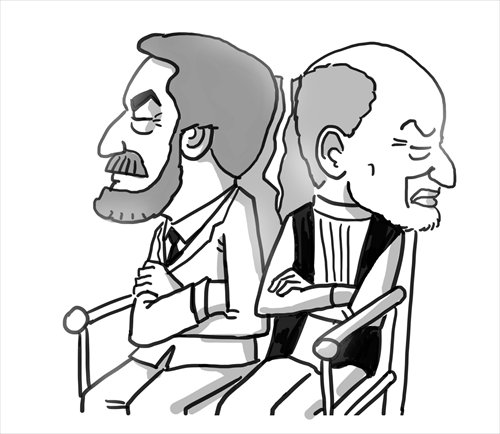HOME >> OP-ED
Testing times begin for Afghan-style democracy
By Shadi Khan Saif Source:Global Times Published: 2014-10-7 19:03:01

llustration: Liu Rui/GT
Afghanistan's Independent Election Commission (IEC), under obvious pressure, stopped short of announcing details on the much awaited presidential elections results in late September. Instead, the IEC simply declared Ashraf Ghani the future Afghan president, while his rival Abdullah Abdullah was made chief executive officer.
The settlement between the two candidates has evoked an optimistic response from influential world capitals. But practically speaking, it is yet another reminder of crude political wheeling and dealing in a nascent democracy that remains mired in primitive tribalism.
According to sources in the IEC, Ghani won 55.27 percent of the vote, while his opponent Abdullah won 44.73 percent of the vote. But the election body was reportedly asked by "higher-ups" and "international friends" not to make the details public, in line with the demands of the losing side.
The "stealth" announcement of the landmark election results took many by surprise. Afghans stormed social media websites, expressing anger over the mockery of democracy in this war-torn country.
Senior Afghan journalist Daud Junbish held the IEC, the UN and the US all responsible for failing to let Afghans know the detailed result. Female Afghan journalist Waslat Nazimi took to Twitter to say, "Almost one year of dedication to these elections and in the end we don't even get any figures or results! Democracy failed?"
Nevertheless, some quarters are happy that the months-long process has finally yielded a result, ending a period of torturous uncertainty.
Under the accord, which rendered both rounds of the presidential election meaningless, the winner, former World Bank economist Ghani, was sworn in as president on September 29 and the runner-up as chief executive, a position specially created to address Abdullah's allegation of industrial-scale rigging and to ward off the looming threat of a return to civil strife.
Given their frequent testy exchanges, how well the implacable political foes will be able to share power and work together to put Afghanistan on the road to stability remains in doubt.
Their mistrust, political analysts say, is too deep-seated to go away in the near future and will pose an impediment to good governance. There are already overt rifts between the two campaigns over the chief executive officer's authority.
In addition to dealing with the demands of an intransigent coalition partner, the new president will have to contend with a whole host of intractable challenges, including reconciliation with the insurgents, fence-mending with neighbors, notably Pakistan and Iran, curbing the illicit drug commerce and forging a consensus on a post-2014 NATO presence.
NATO's pullout, arguably, stands alone as the biggest challenge for the new government. This will have the new government not just worrying about maintaining law and order, but also providing salaries for a 300,000-strong national army, to say nothing of keeping it united under the national flag and motivated to fight a decade-old insurgency.
Afghans, however, have placed great hopes in Ghani, who, unlike many in the political arena in this country, has no blood on his hands.
Instead, he brings to his new post a sterling reputation and proven administrative abilities while serving as country's finance minister and chancellor of Kabul University.
Ghani has also made lots of promises to his supporters. How well he converts his words into action will become evident as he takes office as president of Afghanistan.
The author is a Pakistan correspondent for Asia Calling TV Network & Deutsche Welle Germany. opinion@globaltimes.com.cn
Posted in: Viewpoint